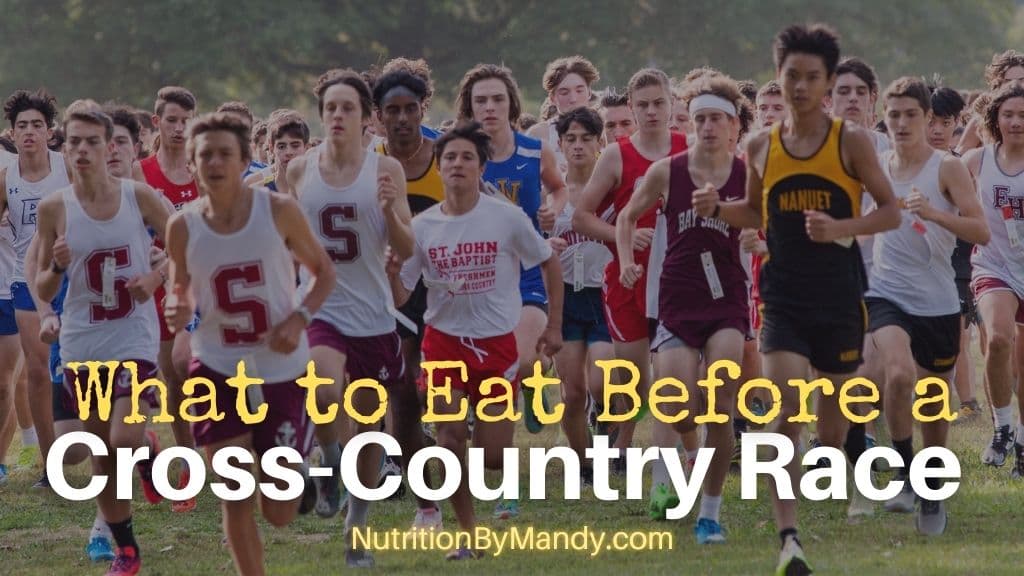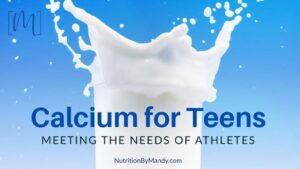Last Updated on December 15, 2024 by Mandy Tyler, M.Ed., RD, CSSD, LD
What to Eat Before a Cross-Country Race
With early morning start times, it can be a challenge for athletes to know what to eat before a cross-country race.
Below are ideas for the best meals and snacks athletes can eat to fuel their run and support optimal performance.
What to Eat Before a Cross-Country Race: Meals and Snacks
When determining what to eat before a cross-country race, the timing of the meal should be considered. Eating too much food, too close to the start of the race, may lead to GI distress during the run (1).
In general, the less time an athlete has before the start of the race, the smaller the size of the pre-race meal should be. In addition, as the time of the race gets closer, athletes should focus on consuming carbohydrates for energy.

Breakfast Before a Cross-Country Race
When athletes have several hours (2-3 hours) before the start of the race, they can plan to eat a carbohydrate-rich breakfast or mini-meal to provide them with energy for the upcoming run.
The meal should be high in carbohydrates, contain a moderate amount protein, and be relatively low in fat and fiber.
High-carb breakfast ideas for before a cross-country race include:
- Fruit smoothie
- Bagel with nut butter
- Instant oatmeal with walnuts and raisins
- Fruit and yogurt parfait with berries and granola
- Kodiak Cakes® toaster waffles with banana
High-Carb Snacks Before a Cross-Country Race
In the hour before the start of the race, I encourage runners to enjoy a high-carb snack that will provide them with a quick source of energy for the upcoming run.
High-carb snacks that runners can enjoy prior to the start of a cross-country race include:
- Fresh fruit: Bananas, grapes, apples, oranges, pears, peaches, plums
- Applesauce squeeze pouches
- Dried fruit, fruit leather, fruit snacks
- Low-fat granola bars, cereal bars
- Pretzels, graham crackers, animal crackers
- Mini bagels, dry cereal (low in fiber)
- Sports drink, chews, or gels
Athletes should plan ahead for snacks they can eat on the bus or pack in their gym bag to have available at the race.
I also like to remind runners that they do not have to eat the full piece of fruit or granola before the race. Even a few bites of a banana or gulps of a sports drink can provide athletes with additional energy as they head into the run.

What to Eat the Night Before a Cross-Country Race
I am often asked what is the best dinner for a runner to eat the night before a cross-country race. In general, I encourage a meal that is high in carbohydrates and contains a moderate amount of lean protein.
However, perhaps most important for runners is to stick to foods that are familiar and that they know sit well on their stomachs.
Runners should avoid foods that are overly spicy, greasy, or that may cause indigestion and disrupt their sleep.
Dinner ideas may include:
- Pasta with marinara sauce and turkey meatballs, breadsticks
- Grain bowl with grilled chicken, brown rice, leafy greens, veggies, hummus, pita bread
- Salmon filet, baked sweet potato, fresh sliced fruit cup, chicken noodle soup, dinner rolls
- Turkey sub sandwich, pretzels, fruit and yogurt parfait
Pro Tip: Aim to fill half of your dinner plate with carbohydrate-rich food items.
Enjoying a healthy fruit smoothie made with a variety of frozen fruits, banana, Greek yogurt, and high-protein milk can be a nutritious, carbohydrate-rich evening snack before bed.
What Not to Eat Before a Cross-Country Race
Each runner I work with is unique in terms of what foods and beverages they feel best consuming prior to a race. However, there are some foods that are more likely to cause GI distress during a run.
In general, runners should limit foods that are high in fiber, fat, and/or protein too close to the start of a race (1).
Before a morning cross-country race, this includes foods such as:
- High-fiber breads or cereals
- High-fat or greasy breakfast meats such as bacon and pork sausage
- Heavy cream, cheese, or greasy sauces such as gravy
- Fried foods such as fried potatoes or donuts
- Beans and high-fiber vegetables
Don’t Try New Foods on Race Day
Another important point I emphasize to runners is not trying any new foods or drinks on race day. It can be tempting at cross-country races to try the variety of pre-race bars, sports drinks, and other snacks made available to the runners.
However, runners should avoid any unfamiliar items and stick to their race day fueling plan. Going into a race with pre-race meals and snacks they are comfortable with will give them confidence that they are fueled to run at their best.

Nervous Stomach Before a Cross-Country Race
Some runners experience pre-race jitters or get a nervous stomach and struggle to eat food close to the start of the race. These athletes often share that eating makes them feel nauseous or worry they will have to go to the bathroom during the race.
Runners that have sensitive stomachs before a race may consider getting their carbohydrates from a liquid source, such as a sports drink, rather than food.
Sports drinks are formulated to contain fluid as well as carbohydrates and electrolytes. The carbohydrates will provide the runner with added energy heading into their race. In addition, the fluids and electrolytes can help ensure the runner starts the race in a hydrated state.
I have also found that many athletes can tolerate applesauce well in the hour before a run. The applesauce squeeze pouches are a portable pre-race snack option that are convenient for runners to take with them to the race.
Should You Carb Load Before a Cross-Country Race?
Carb-loading is recommended for athletes participating in endurance events lasting longer than 90 minutes (1). Since a typical cross-county race is much shorter than this, following a specific carb-loading protocol is generally not necessary.
However, it is important for cross-country runners to ensure they are consuming adequate carbohydrates (and total calories) in their daily sports nutrition meal plan to support their high level of training.
In addition, I encourage cross-country runners to enjoy carbohydrate-rich meals and snacks leading up to their events, such as those discussed above.
Plan Ahead for Travel
If athletes are traveling out of town for a cross-country race, it is important they have a nutrition plan in place for race day.
If possible, athletes should pack familiar foods that they can eat for breakfast in their hotel room. Items such as whole, fresh fruit, dried fruit, applesauce squeeze pouches, packages of instant oatmeal, bagels, and individual packets of nut butter are all great options to pack for the trip.
If athletes plan to eat breakfast at the hotel buffet, they should eat familiar foods that they are comfortable consuming before a race.
Hydration for Your Cross-Country Race
When athletes are planning what to eat before a cross-country race, it is important they consider their hydration needs as well.
Dehydration can negatively impact performance and increase a runner’s risk of heat illness (2). Therefore, starting the cross-country race in an optimally hydrated state is important for athletes.
Take time to review my blog on hydration tips for athletes to ensure runners have a hydration plan in place.

What to Eat Before a Cross-Country Race
You are now set with ideas for what athletes should eat before a cross-country race to ensure they are fueled for optimal performance.
For additional sports nutrition tips, check out my blog on the best fruits for runners.
Join the Nutrition By Mandy Email List & Get a Free Weekly Meal Planner Template
Click HERE to join the Nutrition By Mandy e-mail list. When you join you will receive a free weekly meal planner template to download and plan out your meals for the week.
About the Author
Mandy Tyler is a Sports Dietitian Nutritionist in the San Antonio, TX area. She is a Registered and Licensed Dietitian, a Board-Certified Specialist in Sports Dietetics, a Licensed Athletic Trainer, and is a Certified Exercise Physiologist through the American College of Sports Medicine. Mandy has experience working with athletes at the high school, collegiate, and professional levels. She believes the key to reaching one’s full potential, both in everyday life and in sports performance, relies on a healthy nutritional foundation.

If you are looking to take your performance to the next level, make sure to check out my new Sports Nutrition Game Day Guide. This downloadable guide is written to help athletes develop an individualized plan to achieve peak performance on game day.





